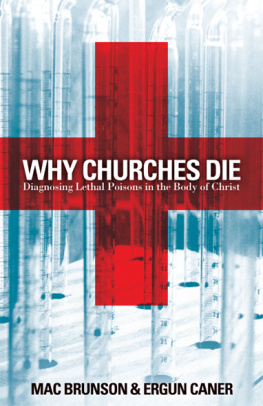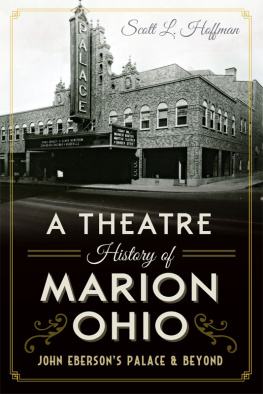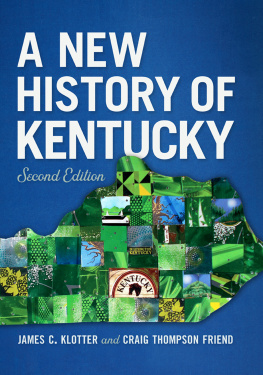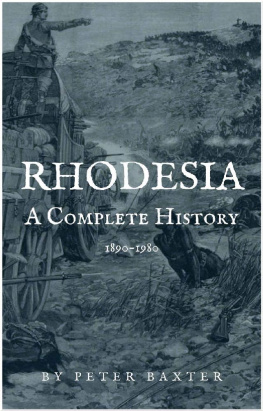Copyright 1992 by the Kentucky Historical Society
Library of Congress Cataloging-in-Publication Data
Lucas, Marion Brunson, 1935
A history of Blacks in Kentucky.
p. cm.
Includes bibliographical references and index.
Contents: v. 1. From slavery to segregation, 17601891/ by Marion B. Lucas v. 2. In pursuit of equality, 18901980/ by George C. Wright.
1. Afro-AmericansKentuckyHistory. 2. Kentucky History. 3. KentuckyRace relations. I. Wright, George C. II. Title.
E185.93.K3L83 1992 | 92-24574 |
976.9'00496073-dc20 | CIP |
v. 1 | ISBN 978-0-916968-20-5 (hard cover) ISBN 978-0-916968-32-8 (paper) |
v. 2. | ISBN 978-0-916968-21-2 (hard cover) ISBN 978-0-916968-37-3 (paper) |
set | ISBN 978-0-916968-23-6 (hard cover) |
The Kentucky Historical Society dedicates these volumes to Senator Georgia Davis Powers and Dr. Henry E. Cheaney. In 1978, Powers, the first black woman to serve in the Kentucky State Senate, sponsored the resolution funding this project. Cheaney, a pioneer in the study of Kentucky blacks and for many years chairman of the Afro-American studies program at Kentucky State University, helped lay the groundwork which made this project possible.
To my good friend, Terry Lynn Birdwhistell
George C. Wright
Acknowledgments
THE completion of this book was made possible because of the financial support of several institutions and the scholarly assistance I received from librarians and historians. I owe a debt of gratitude to the reference librarians at Perry-Castaeda Library at the University of Texas, the Widener Library at Harvard University, James M. Prichard of the Kentucky Department for Libraries and Archives, and the staff of the Department of Special Collections at the University of Kentucky. Dedicating this book to Terry Birdwhistell, university archivist at the University of Kentucky, does not fully do justice to his support and encouragement. On my numerous travels to Kentucky, Terry provided an office and library facilities, photocopied any number of documents, and actively took part in helping acquire research materials by accompanying me on my searches for documentation throughout the Commonwealth. James C. Klotter, executive director of the Kentucky Historical Society, state historian and leading scholar of Kentucky history, shared his notes and made a number of helpful suggestions on the manuscript. My good friend, Professor Albert S. Broussard of Texas A&M University, read the manuscript and made his usual insightful remarks. Travel funds were provided by the University of Texas Research Institute, the Dora Bonham Memorial Fund of the Department of History, the African and Afro-American Studies and Research Center at the University of Texas, and the Kentucky Historical Society. Finally, I appreciate the patience, support, and encouragement that I received throughout this project from my wife, Valerie Ellison Wright, and my daughter, Rebecca Ellison Wright.
One
Black Life from the 1890s to the Great Depression
BY 1890, of Kentuckys 1,590,462 citizens, 268,071 or 16.9 percent were black. When compared with 1860, the actual number of blacks had increased, but always at an uneven pace from decade to decade. For instance, from 1860 to 1870 the black population decreased by almost 14,000, as many exslaves left the state for the North; yet from 1870 to 1880 the black population experienced its largest increase ever when it grew by 22.2 percent to 271,451. The next decade, 1880-90, saw a decline of 3,000 in the black population. But in a complete demographic shift from the previous ten years, the black population grew by almost 14,000 (a rate of 6.2 percent) from 1890-1900, reaching 284,706. By contrast, the states total population increased consistently, growing from 1,155,684 in 1860 to 2,147,174 in 1900. Its smallest period of growth was from 1880-90, when it increased by only 12.7 percent. Throughout this period, and indeed down to the present, both the percentage and number of blacks in the total population of Kentucky remained by comparison much smaller than in any of the states in the South.
Furthermore, by 1890 and most surely the start of the new century, the black percentage of the total population had decreased, and Afro-Americans were becoming concentrated in several areas and almost nonexistent in other regions of the state. In 1860 blacks comprised 20.4 percent of the total population. Thirty years later this had dropped to 16.8 percent; the percentage of blacks within Kentucky continued to decline so that by 1930 less than nine of every one hundred Kentuckians were Afro-Americans. By 1900 some of the counties in the eastern Kentucky mountains had less than twenty blacks, with Johnson and Elliott counties combining for a grand total of three black residents. At the opposite end of the scale was Jefferson County (comprising the city of Louisville), the central Kentucky area around Lexington, and an area in southwest Kentucky. Louisville had the largest number of blacks, around 44,000. The greatest concentration of Afro-Americans, however, lived in twenty counties surrounding Lexington. For instance, Fayette had 15,409, while Boyle, Clark, and Franklin each had around 5,000 and Madison had 6,690 blacks. In these counties blacks comprised anywhere from a fourth to a third of the population. A substantial number of blacks also resided in Christian, Henderson, Daviess, and Hopkins, all in southwest Kentucky. For instance, in Christian County blacks comprised 43.7 percent of the population in 1900.
Like their counterparts farther south, black Kentuckians were migrating from rural areas to cities both large and small within the state. Of the states total population in 1890, three out of four Kentuckians lived in rural areas; however, one in three blacks, roughly 100,145 of the states 284,706 Negroes, lived in cities. Clearly, they made up a large percentage of city dwellers. They comprised 52.4 percent of the residents in Winchester, 46.7 percent in Shelbyville, 44.9 percent in Richmond, 44.6 percent in Danville, and 44.5 percent in Hopkinsville. After Louisville, the largest numbers of blacks were found in Lexington (10,130), Paducah (5,814), Frankfort (3,316), and Hopkinsville (3,243). According to the 1910 census, Afro-Americans made up almost 20 percent of all the people living in Kentuckys urban areas; by 1940 55 percent of the states black citizens lived in urban areas.
Undoubtedly, countless numbers of Afro-Americans migrated from rural Kentucky, and ultimately from the state, because of the difficulties they experienced in acquiring or holding on to farm lands. Despite the states reputation for having very fertile land and being a place where industrious, hardworking farmers could prosper, most white and black farmers experienced hardships that were all too common to farmers throughout the South. To be sure, the state had a sizable number of self-sufficient farmers who produced livestock and food products to sustain themselves and to sell at the marketplace, but far more farmers relied solely on a cash crop, usually tobacco, and the success or failure of their crop determined whether or not they survived, were in debt, or faced foreclosure.











